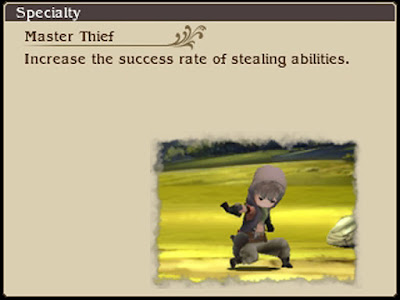When RNG Saps the Fun from Special Abilities
This is going to be a short one written in a spur of inspiration after reading Marcia's recent post on the Pre-Greyhawk Thief & Exception Based Design so go give that a quick read it's pretty short). This is more or less a regurgitation of that and some thoughts on why I like Exception Based Design (and how RNG can ruin it). Much like my own post on Hirelings as Specialists, Marcia's hints at the broader issue with the Thief: The RNG. ((Or Random Number Generation, eg Dice Rolling to see if you succeed or fail.))
((Bravely Default Thief - Cause I couldn't think of a better image - Source: https://lparchive.org/Bravely-Default/Update%20128/ ))
Now RNG definitely has its place in TTRPGs! I keep mulling over Unboxed Cereal's recent post about Dolls & Cats as a means of framing different ways of running RPGs (Dolls which you act upon and through, vs Cats which have a kind of will of their own via RNG). Random encounters, fumbles, crits, weather, heck even the character themselves! RNG can help breathe a new and unpredictable life into RPGs! But you know where it can absolutely sap out the fun? Special abilities.
To use Marcia's example of Pandemic; the game's classes are enticing and fun because they have game breaking abilities that are predictable. You can actively plan around a certain degree of consistency with them, Medics always remove all the cubes in a city, Quarantine Specialist always prevent the spread. Meanwhile the Thief often starts with staggeringly bad chances to do their cool thing and starts at a bit of a disadvantage as compared to the rest of the party.
This sucks. It's also why I think universal resolution mechanics are rarely compelling to me (especially the ones that boil down to coin flips). It's also why I think a lot of games framed around PbtA-styled guaranteed moves are often compelling to me (especially the ones with weird game-breaking abilities). This isn't to say RNG doesn't have its place within moves, skills and abilities, but just that there should be some degree of predictability in your experts' performance (especially when they have non-random set backs to compensate). Something, something, I'm pretty sure Savage Worlds or Deadlands (or both) have a perk system that I does something adjacent to this.
I'm going to give an example from a more freeform game my buddy @waffleboycony is running (Age of the Cycle), because they still apply RNG to special abilities brilliantly with one of its starring characters:
Kerrek (one of the player characters) worships the god of catastrophe Disrin. Should he wish to commune with Disrin he can do so, no roll required. Now if Kerrek wants the rest of the party to be "on the call" or wants to contact a different god (especially if it's a rival of Disrin) that's a roll of varying difficulty, albeit with better odds than the rest of the party could muster. While this seems simple enough it illustrates my point perfectly. Kerrek has a guaranteed, reliable, base ability that distinguishes him from the rest of the party and always puts at least one option on the table. Outside of that his higher aptitude mitigates the chance of failure, but doesn't erase it, allowing the dice to help weave a story that none of us can quite predict. An excellent balance.
In a more structured game this also allows for classes to really start shining! I love the idea of having a universal game at the table, that everyone is breaking in their own subtle and unique ways. In my own Mecha Tactics game, I tried to make the most memorable MEC parts break the normal combat flow in new and interesting ways. My gold standard was when players would turn to each other and say "You can do what."
To use an Elf Game analogy, there's things Legolas can straight up do that completely recontextualize the party's options. It's not "Legolas! Can your elf eyes see well today?" This can (depending on the game) bring up an issue of balance, but I think this is often where resource management for abilities, and "charges" can be an elegant solution (especially when it comes to very powerful abilities). There's also the issue of a certain ability being the "optimal" game breaking ability, but I think this comes up a lot less in freeform play where "optimal" is subjective to any of a hundred goals the party could have.
Cyberpunk 2020 attempts to do this with its classes. The Solo will almost always shoot first in combat and has an edge in detecting danger. Meanwhile the Nomad draws strength in numbers and can literally call upon an entire caravan under the right conditions. Sure the Solo is optimal in a gunfight, but no one will trust them the way the Media is trusted. ((This also creates really cool synergies, where a Corpo can be arming a Solo who is getting jobs from a Fixer and they're all helping the Media investigate a Militech conspiracy))
Counterpoints that I can see:
- "But raw chaos and often failing is part of the fun!" OK sure, but I like classes that I can plan around instead of having to simply plan around my GM's brain of what will and won't come down to a roll. Again, a mix is good IMO.
- "But that makes it too much of a Board / Video Game!" RPG has Game in the name for a reason. Cope. (jk jk - I do find I lean more into more "structured" styles of play, where player choices and consequences can be somewhat gleaned from said structure. The OSR "Telegraph danger" creed can also be applied to "Telegraph safety" - Even in systems where torches randomly go out, I know it will illuminate the room when lit and I will get at least a turn of light out of them. The game would be all kinds of miserable otherwise, and unless that's what you're going for, you should consider making certain abilities at least as reliable as torches. Especially when Players have to accept setbacks just for having said abilities.)
- "The Thief isn't that bad!" Potentially! I've never played OD&D so I honestly don't know. I have however played a variety of characters (usually mages) whose abilities are exclusively tied to RNG and it usually takes the wind out of things! It's why I gravitate towards "martial" type characters in a lot of games (which is a whole other discourse).




Comments
Post a Comment